#Plutarque
Explore tagged Tumblr posts
Text

"Parmi les inscriptions que l’on peut lire à Delphes, deux sont tout à fait vitales :"Connais-toi toi-même" et "Point d’excès", car tout le reste en découle. Ces deux maximes résonnent, s’accordent l’une avec l’autre et semblent s’éclairer mutuellement autant qu’il est possible : la connaissance de soi exclut les excès et ceux-ci excluent la connaissance de soi."
Plutarque, Consolation à Apollonios, trad. Nicolas Waquet, Ier siècle apr. J.-C.
29 notes
·
View notes
Text
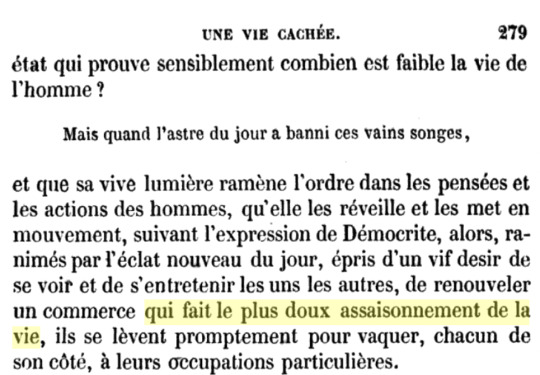
#Plutarque#S'il est vrai que l'on doit mener une vie cachée#Plutarch#Oeuvres Morales#Antiquité#Antique#Classic#Classical#democritus#Démocrite#Amitié#Civilisation#Civilité#entraide
4 notes
·
View notes
Photo

Alexandre le Grand et la Destruction de Persépolis
En 330 avant notre ère, Alexandre le Grand (356-323 av. J.-C.) conquit l'empire perse achéménide après sa victoire sur l'empereur perse Darius III (r. de 336 à 330 av. J.-C.) à la bataille de Gaugamèles en 331 avant notre ère. Après la défaite de Darius III, Alexandre marcha vers la capitale perse de Persépolis et, après avoir pillé ses trésors, brûla le grand palais et la ville environnante, détruisant des centaines d'années d'écrits religieux et d'art, ainsi que les magnifiques palais et salles d'audience qui avaient fait de Persépolis le joyau de l'empire.
Lire la suite...
2 notes
·
View notes
Text
Ils ont en eux un souffle toujours vivant et une âme inaccessible à la vieillesse.
0 notes
Text
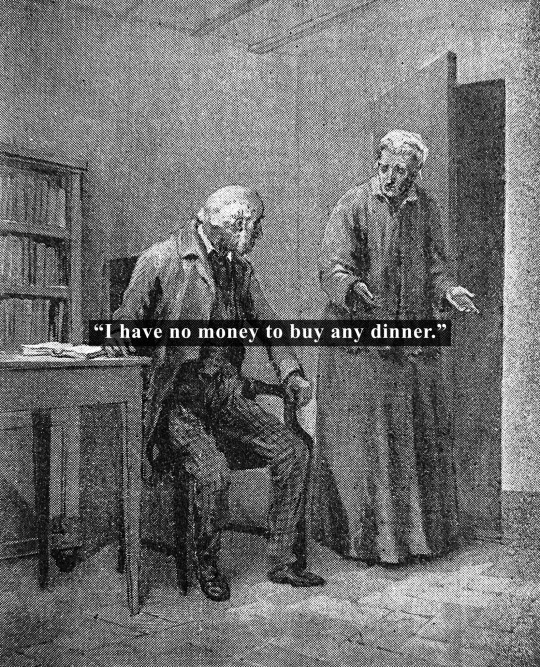

There is one thing even more sad than having no money to buy bread at a baker's, and that is, not to have money to buy medicine at the chemist's.
— Les Misérables, IV.IX.III Illustrated by Carlo Chiostri (Italian Edition, 1930)
#les miserables#les mis#mabeuf#mother plutarque#chiostri illustrations#illustration#Always crying over those two
52 notes
·
View notes
Text
Mabeuf!!!
Mabeuf is hilarious. He's apolitical, although he respects those who are not, but he also happens to be growing the most political fruit in 1830s France: the pear. Although the connection to Louis-Philippe isn't made here, it does suggest that as much as one may want to remain distanced from politics, circumstances determine how much a person is able to maintain that distance, not the person themself. Mabeuf may have no political opinions, but that doesn't mean that politics don't affect him, or that others can't read politics into his actions (as I just did; he doesn't mean anything with those pears, but I can't see a pear without thinking of Louis-Philippe). More importantly to Mabeuf, only the truly fortunate can really escape politics:
"The Revolution of July brought a crisis to publishing. In a period of embarrassment, the first thing which does not sell is a Flora. The Flora of the Environs of Cauteretz stopped short. Weeks passed by without a single purchaser."
Mabeuf is poor in a similar way to Marius, where he's able to get by and even pay for some "luxuries" (as in, some simple enjoyments and/or a hobby), but his financial stability could disappear very quickly. The publishing crisis after the July Revolution caused just that. Without income from publishing, his situation became much more precarious, and while he still seems content and didn't suddenly become political, the consequences of politics on his life demonstrate the challenges of that position. It's nice that he's not prejudiced in the way Gillenormand is because of his "neutrality," but he's also not advocating for himself when these changes really do affect him. In a way, he's similar to Bishop Myriel, whose community efforts were great in every respect except the political. Mabeuf doesn't have that level of authority, but he shares many sentiments with the bishop: love of people (it's why he goes to church), respect for nature and knowledge, and a generally kind attitude. His lack of political beliefs hurts him more than it hurts his community, but it's still interesting to see this "flaw" repeated in a different way.
It's intriguing how Mabeuf's apolitical stance is linked to his distaste for violence as well. For instance, while he's friendly with several Bonapartists because he won't condemn their opinions, he's also extremely uncomfortable living at "Austerlitz," which shares the name of a famous battle during the Napoleonic Wars. Additionally, he flinches at all violence, with the example given being linked to the French Revolution. Weapons from the Invalides were used to storm the Bastille, so while Mabeuf is just avoiding a place because he dislikes cannons, he's also overlooking the way that politics is all around him because he detests violence. His stance on violence isn't wrong - we see a variety of justifiable positions on violence in the novel, with Valjean falling in the "no violence at all" camp as well - but the (a)political framing of his nonviolence is telling. It may be that he dislikes politics because he sees it as inherently violent (which is fair, given that he's lived through many violent moments in French history), which says as much about his experiences with politics as it does his personal feelings.
Even though Mabeuf's avoidance of politics is definitely a bad thing in a book with a very political message, I really love his character. He just loves books and plants! That's great for him, and it would be a pretty ideal way of life if he lived in a system that didn't place his livelihood at constant risk. He also has what is probably the best response to being asked about relationships that I've read:
"However, he had never succeeded in loving any woman as much as a tulip bulb, nor any man as much as an Elzevir. He had long passed sixty, when, one day, some one asked him: “Have you never been married?” “I have forgotten,” said he. When it sometimes happened to him—and to whom does it not happen?—to say: “Oh! if I were only rich!” it was not when ogling a pretty girl, as was the case with Father Gillenormand, but when contemplating an old book."
"I've forgotten" is definitely the funniest way to answer that question, and I love that books are his main motivation in everything. Hugo's a bit crueler about Mother Plutarque's similar avoidance of relationships, saying "None of her dreams had ever proceeded as far as man. She had never been able to get further than her cat." "Proceeded" implies that love of a man would be better than love for her cat, which also suggests that she should have gotten married. Granted, this is only implied here, but it does seem to be another instance of the strange tension between there being a lot of unmarried, somewhat sympathetic women in this book and Hugo thinking that marriage/motherhood is the ultimate goal for women. Mother Plutarque seems quite content with her cat, though, so if it weren't for the issue of poverty, she and Mabeuf would have been pretty happy with their very bookish lives.
#les mis letters#lm 3.5.4#mabeuf#mother plutarque#I think that Mabeuf and Mother Plutarque basically reached the pinnacle of the convent gardener lifestyle#before poverty caught up to them#and I really wish that he'd been able to keep being a bibliophile in peace#his story always makes me so sad#even if his words and his pears make me laugh
44 notes
·
View notes
Text
Fables et fabulistes : Plutarque - Philosophe- moraliste et fabuliste Grec (46-125ap JC)
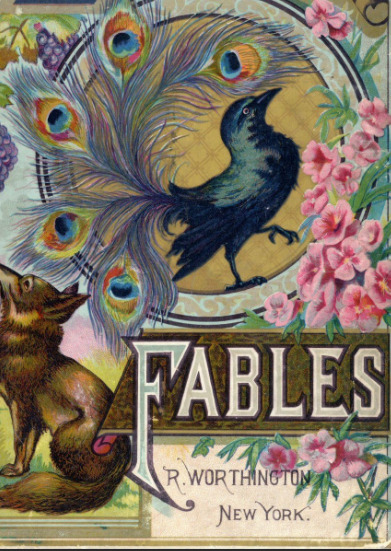
View On WordPress
0 notes
Text
IV.iv.2 La Mère Plutarque N’est Pas Embarrassée Pour Expliquer Un Phénomène
Wraxall and Denny abbreviate it similarly, with “Mother Plutarch Accounts For A Phenomenon” and “Mère Plutarque Accounts For A Phenomenon” respectively.
Mother Plutarch is not Embarrassed on the Explanation of a Phenomenon: Wilbour
Mother Plutarch Accounts For A Phenomenon: Wraxall
Mother Plutarque Finds No Difficulty In Explaining A Phenomenon: Hapgood
Mother Plutarch is not Embarassed to Account for a Phenomenon: Jolivet
Mère Plutarque Accounts For A Phenomenon: Denny
Mother Plutarch is not Embarrassed by the Explanation of a Phenomenon: FMA
Mother Plutarch Doesn't Mind Explaining a Phenomenon: Rose
Mère Plutarque at No Loss to Explain an Extraordinary Phenomenon: Donougher
9 notes
·
View notes
Text
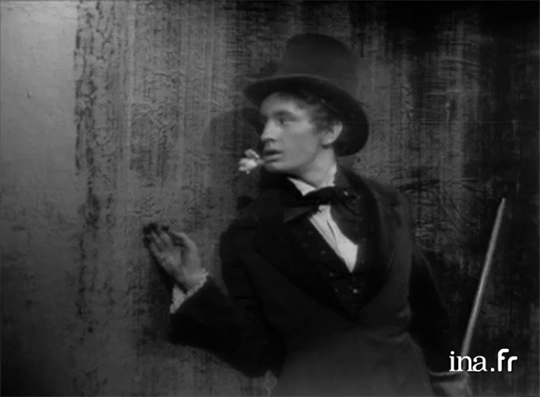


LES MIS LETTERS IN ADAPTATION - Mother Plutarque Finds No Difficulty in Explaining a Phenomenon, LM 4.4.2 (Le Théâtre de la jeunesse: Gavroche 1962)
Montparnasse on the hunt at such an hour, in such a place, betokened something threatening. Gavroche felt his gamin’s heart moved with compassion for the old man. What was he to do? Interfere? One weakness coming to the aid of another! It would be merely a laughing matter for Montparnasse. Gavroche did not shut his eyes to the fact that the old man, in the first place, and the child in the second, would make but two mouthfuls for that redoubtable ruffian eighteen years of age. While Gavroche was deliberating, the attack took place, abruptly and hideously. The attack of the tiger on the wild ass, the attack of the spider on the fly. Montparnasse suddenly tossed away his rose, bounded upon the old man, seized him by the collar, grasped and clung to him, and Gavroche with difficulty restrained a scream. A moment later one of these men was underneath the other, groaning, struggling, with a knee of marble upon his breast. Only, it was not just what Gavroche had expected. The one who lay on the earth was Montparnasse; the one who was on top was the old man. All this took place a few paces distant from Gavroche. The old man had received the shock, had returned it, and that in such a terrible fashion, that in a twinkling, the assailant and the assailed had exchanged rôles.
#Les Mis#Les Miserables#Les Mis Letters#Les Mis Letters in Adaptation#Jean Valjean#Valjean#Montparnasse#Gavroche#Gavroche Thenardier#LM 4.4.2#Le Théâtre de la jeunesse#GET HIM JEAN#pureanonedits#lesmisedit#lesmiserablesedit
66 notes
·
View notes
Text
I consider myself an agnostic hellenic polytheist. In other words - I follow the Gods but I think it's impossible to be certain they exist, and as a result I don't believe in them 100%.
I am conforted in this by the knowledge this was already a thing in Ancient Greece, according to the book La Critique des Traditions Religieuses chez les Grecs, des origines au temps de Plutarque by Paul Decharme. He reports how Protagoras, at some point in the 5th century BCE, wrote that "Concerning the gods, I have no means of knowing whether they exist or not, nor of what sort they may be, because of the obscurity of the subject, and the brevity of human life." According to Diogenes two centuries later, this led to him being expelled from the city, but some historians see no evidence of that so it is very much possible such ideas were accepted or at least tolerated (this part I got from wikipedia).
He also talks about how the Ionians, while still venerating and respecting the Gods, thought science could be pushed farther and higher than Them, and how this was not impious.
Anyway, I know I don't need Ancient Greeks to support me in my beliefs, that they're perfectly valid regardless, but it still feels nice :3
Also I totally recommend this book! I haven't finished it yet but I'm loving it. Although I don't know if it exists in any language other than French :( If anyone's interested I could share my translated notes once I finish it.
5 notes
·
View notes
Text
Captain Blake has amnesia.
First off, it's @vicompte-de-latarteaucoing who noticed this.
Let me explain;
Blake didn't know what Olrik looked like in Le Secret de L'Espadon because he'd never met him before.
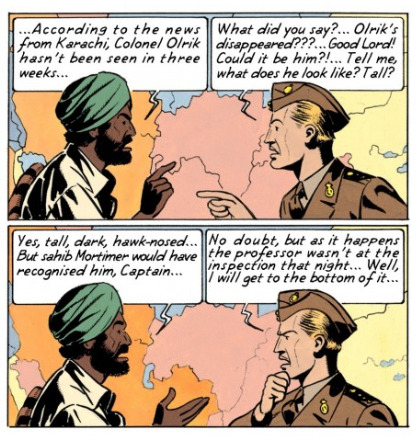
Le Secret de L'Espadon, by E. P. Jacobs (p. 29, tome 3)
However, in Le Baton de Plutarque (which is set before Le Secret de L'Espadon), Blake has a small talk with Olrik and even has dinner with him.
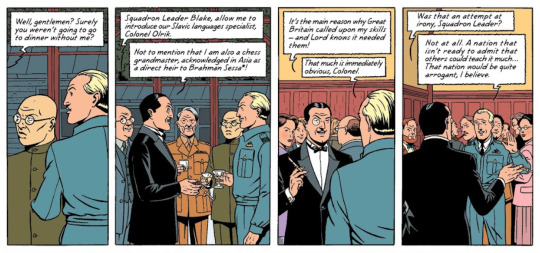
Le Baton de Plutarque, by A. Juillard et Y. Sente (p. 35)
Has he sudently lost all his memories of the very talented Colonel Olrik? ...Or are the authors of Le Baton de Plutarque inconsistent with the original work?
I don't think it would be a bad thing if the new authors bothered to reread the E. P. Jacobs albums…
30 notes
·
View notes
Text

"C’est toucher au bonheur, en effet, que de ne plus être soumis à l’esclavage de la chair et à ses affects qui ravalent l’esprit souillé par la vanité de la vie humaine."
Plutarque, Consolation à Apollonios, trad. Nicolas Waquet, Ier siècle apr. J.-C.
7 notes
·
View notes
Photo

Thucydide
Thucydide (c. 460/455 - 399/398 av. J.-C.) était un général athénien qui a écrit La guerre du Péloponnèse, le conflit entre Athènes et Sparte qui dura de 431 à 404 avant notre ère. Cependant, La guerre du Péloponnèse de Thucydide ne fut jamais achevée et se termine à mi-parcours au cours de l'hiver 411 avant notre ère. La guerre du Péloponnèse fut divisée en 13 livres distincts par les érudits ultérieurs, mais elle est maintenant, dans sa forme moderne, divisée en huit livres. Thucydide est souvent considéré comme le premier historien à utiliser des idéaux "modernes" en ce qui concerne ses méthodologies et ses idéologies, notamment la façon dont il utilise des témoins oculaires comme sources et les contre-interroge, et la façon dont il utilise les discours (une question très débattue en raison du problème d'interprétation de ce que Thucydide veut dire lorsqu'il décrit la façon dont il s'y prend pour les rédiger, comme dans (1.21), où il n'est pas clair si les discours qu'il cite peuvent être considérés comme des comptes rendus exacts de ce qui a été dit, ou s'ils ont été légèrement fabriqués par Thucydide pour l'aider dans ses thèmes). Son œuvre est conçue comme un "bien pour tous les temps" (1.22), plutôt que comme un ouvrage destiné à plaire au public (l'une des nombreuses attaques possibles de Thucydide à l'encontre d'Hérodote et des autres chroniqueurs en prose de l'époque).
Lire la suite...
0 notes
Text

Blake et Mortimer - T23 - Le Bâton de Plutarque
51 notes
·
View notes
Text

Le 15 mars de l’an 44 avant J.-C., Jules César est assassiné.
« César, enveloppé de toutes parts, ne voit en face de lui, que des glaives acharnés à le frapper au visage et aux yeux ; ballotté entre les mains de tous, il se débat comme un fauve. »
Plutarque
2 notes
·
View notes
Text
Gavroche found Mère Plutarque and M Mabeuf!
Tragically, they’re not doing well. M Mabeuf is good-humored about his poverty, but his assertion that he can live off of apples is a particularly bad sign in that it parallels Gavroche. Gavroche is a child who lives on the streets, having been neglected before his family was imprisoned. That Mabeuf’s situation is remotely comparable suggests that he’s really impoverished.
And it’s Montparnasse and a mysterious elderly man (wow I wonder who?)!
The exchange is hilarious in every way. I love Gavroche applauding and Montparnasse’s complete obliviousness to morals. Valjean’s speech on the importance of work is a bit uncomfortable in how much it valorizes work, but in context, he’s not entirely wrong; being a convict is the most grueling, brutal form of labor we encounter. He’s clearly speaking from experience, too. We know he made several escape attempts, and he used a coin-based tool to cut himself free during the Gorbeau ambush. If these aren’t directly from his own experiences, it’s very likely he’s seen all of the horrors he mentions. Consequently, while his language of “laziness” and “parasites” is off-putting, his motive, at least, is sympathetic: he doesn’t want even the man robbing him to go through what he did.
Notably, this may be the most Valjean has ever spoken. Through scolding Montparnasse, he’s able to speak freely about his experiences in a way that he can’t with, say, Cosette, for fear of revealing his identity and/or scaring her. It’s also a selfless form of speech, meant to aid Montparnasse. As a result, it’s more acceptable to the self-sacrificing Valjean (although I hope saying all of that helped him, too).
I love the ending of this chapter, too. Montparnasse thinking for the first time (it seems interesting that both crime for the sake of crime and unquestioning obedience to authority [Javert] are defined by not thinking, but I don’t have any coherent thoughts on it). Gavroche robbing Montparnasse in another instance of a Patron Minette member not being that competent. Gavroche giving the money to Mabeuf!
32 notes
·
View notes